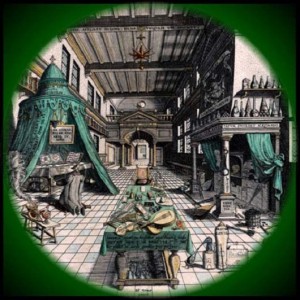
Roman Latkovic
What does digging through Wikipedia logs reveal about Roman?
It reveals Lorenzo Bladuzzi, a writer from Palermo (Sicily), to be the author of Roman’s Wiki page. Delve into Lorenzo’s IP address (recorded as he was writing) and you’ll find out that Lorenzo penned his entries mostly in June of 2009, from Heroica Ciudad de Tlaxiaco, a quaint little city in the state of Oaxaca in México. We know Lila Downs is Tlaxiaqueña, but a more peculiar fact is that the city of Tlaxiaco lies at latitude 17° North, which stretches parallel all the way east to the municipality of Santa Lucia in the province of Ilocos Sur, Philippines.
Now here is where it gets really interesting. Lorenzo Bladuzzi is not a real person, but rather an avatar of a mysterious Mexican-American hacker named León Eugene del Norte. While he was developing a Python wrapper around the Twitter API, del Norte lived in both Tlaxiaco and in Santa Lucia during 2009.
He also happens to know Roman.
Into the Heart of the Amazon
“Pure coincidence is a rare commodity,” wrote Peter Fleming in his wonderfully disastrous tale, Brazilian Adventure: The Classic Quest for the Lost City of Z. Though the fate of Fleming’s Colonel Fawcett remains a mystery, we know that Roman was in Cumuruxatiba, Bahia, on his equally ill-fated misadventure in Brazil during June of 2006. Cumuruxatiba, as you might have guessed already, lies at latitude 17° South, precisely mirroring both of León Eugene del Norte’s locations in the Northern Hemisphere.
The Amphitheatre of Eternal Wisdom
At the tender age of 44 Roman walked into The Stephen A. Schwarzman Building, the historic New York City landmark located on the corner of Fifth Avenue and 42nd Street, better known as the New York Public Library. This wasn’t the first time a pulchritudinous librarian named Caitlin Brennan (she has recurring dreams about a one-eyed swashbuckler fighting saber-toothed tigers, but this is another tale best described in Lorenzo Bladuzzi’s novel Desiderio Robotica) handed him an old alchemical manuscript.
This time it was Amphitheater of Eternal Wisdom by Heinrich Khunrath, and the book, dating back to 1595 A.D., made Roman cry, out of pure joy.
Suddenly, it all made perfect sense.
Innocence
A feeble-minded child threw pebbles in the swimming pool
Hoping I would dive in and bring them back, for the sake of the game.
Com dor de cabeça, I dove after
The pebbles thrown away and I thought
“do not give up, delfina” – said flipper.
I know that the Beatles killed Kennedy.
I know that Queen Elizabeth killed Princess Diana.
I know that a Pope killed a previous Pope
And was killed by the next one.
And I know that I am not guilty of any of these.
And therefore I cry, out of pure innocence.
God’s Little Creatures
After Roman hastily scribbled down his poem (in his defense, it was his first and last), he looked—Caitlin later tweeted to her 15 followers—like the Cheshire Cat, grinning with amusement.

Figure 3 – Gaia, our only home
Look at the exquisite beauty Gaia and marvel. She spins in a blistering pirouette at 70,000 miles per hour and tangoes with the Sun around the Milky Way every 225 million years. Our little blue dot, the Sun, and our galaxy are all falling together into the Virgo Cluster at millions of miles per hour.
And yet, unfazed by her cosmic destiny, Gaia nurtures 5,400 mammalian species, 9,200 snakes, 10,000 birds, some 29,000 fishes, 290,000 species of plants and 920,000 of insects. Among them are about 300,000 beetles. (J.B.S. Haldane, a British polymath of the early 20th century, quipped, God “has an inordinate fondness for beetles.”) Unlike any of the aforementioned species, however, our species seems to be the only one utterly obsessed with our own significance.
Berimbau Perdido
In late August of 2006, absorbed in his own insignificance, forlorn and suddenly destitute, Roman was sitting beneath Morro Dois Irmãos (Two Brothers Hill) in the notorious shantytown favela Vidigal in Rio de Janeiro. Just as he was about to embark on the long walk down the steep and dangerous hill, he heard a berimbau playing inside a small yellowish house. An invisible man’s gravelly voice sang Vinicius de Morais’s lyrics:
Quem de dentro de si
Não sai
Vai morrer sem amar
Ninguém!
English translation:
He who doesn’t come out from inside himself will die without loving anyone
As Roman, always a connoisseur of classical music and opera, listened to that captivating afro-samba tune, he had an epiphany. Though his soul had been beaten to a pulp on his way up Avenida Niemeyer just an hour ago, he no longer despaired. That gravelly voice had made him fall in love with the grandiose opera of life all over again: “I will participate in the game,” he declared, “no matter the pain.“ Better still, fuck the pain.
He also had a flashback to Milos Forman’s movie, Amadeus.
“Too many notes, Herr Mozart.”
He chose to think of himself as Salieri thought of Mozart’s oboe from “Serenade For Winds, K.361: 3rd Movement,” and chuckled. Without that single note, the serenade might have been reduced to a dulcet vaudeville tune, removed from God. Without his own life, it would be like James Joyce had never written “Three quarks for Muster Mark!” in Finnegans Wake, Roman thought, and he laughed and danced away, as clumsily as a tipsy bear, toward the Ipanema beach.
One day, Roman hopes, he might meet the mysterious berimbau player. Or at least have a glass of Sicilian red wine with Lorenzo Bladuzzi.

